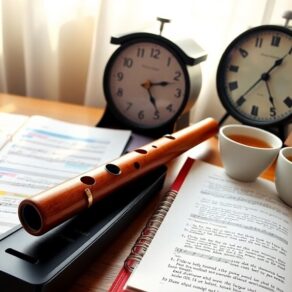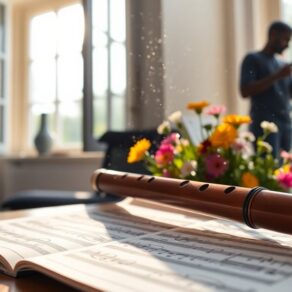A day in the life of a professional flutist starts with a dawn warm-up routine to enhance your breath control and tone production. You'll focus on long tones, embouchure adjustments, and articulation exercises. Daily practice sessions refine your technical skills and repertoire interpretation, often aided by self-recordings for reflection. Rehearsals are collaborative, enhancing artistic development and sound interaction with other musicians. When preparing for performances, you check your flute's condition, immerse in repertoire nuances, and connect with your audience through stage presence. Balancing practice and personal life is essential, ensuring you sustain passion and creativity. There's much more to discover.
Key Takeaways
- A professional flutist begins the day with a morning warm-up routine, focusing on breath control and sound quality through various exercises.
- Daily practice sessions involve technical exercises, repertoire interpretation, and improvisation to enhance skills and emotional expression in music.
- Rehearsals with other musicians foster artistic development, emphasizing sound interaction and creative synergy within a collaborative environment.
- Performance preparations include checking the flute's condition, immersing in repertoire nuances, and engaging with the audience for a memorable experience.
- Balancing life and music requires effective time management, clear goals, and community connections to maintain motivation and avoid burnout.
Morning Warm-Up Routine
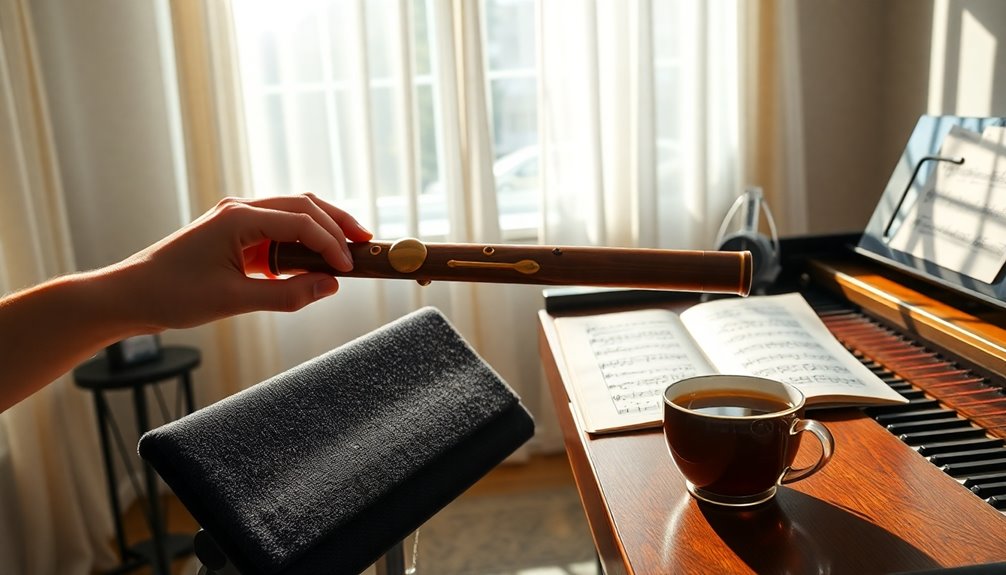
As dawn breaks, you pick up your flute, ready to commence a ritual that sets the tone for your day. This morning warm-up routine isn't just a formality; it's an essential practice that enhances both your breath control and tone production.
You start with long tones, focusing on a steady, controlled airflow. Inhale deeply, feeling the air expand your diaphragm, then release it slowly, allowing the notes to resonate fully.
As you progress through your scales, you pay close attention to your embouchure. Adjusting it slightly can make a world of difference in sound quality. Each note you produce should embody clarity and warmth, reflecting your emotional state as much as your technical skill.
You know that great tone production hinges on the seamless connection between your breath and your instrument. You incorporate various articulations, emphasizing the precision of your tongue against the flute's mouthpiece.
This variety not only prepares your body but also connects you to the music you'll create later. By the time you finish, you feel grounded and ready, having established a solid foundation that will carry you through the day's performances. Additionally, practicing breath control exercises is crucial for managing duration and intensity in your musical phrases, enhancing your overall performance.
Daily Practice Sessions
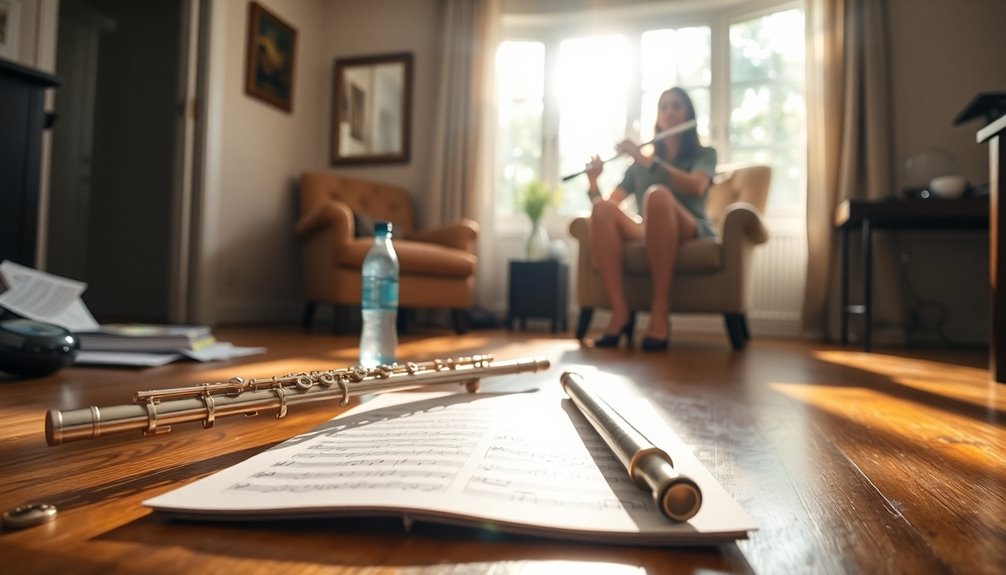
With your morning warm-up behind you, it's time to shift focus to daily practice sessions that hone your skills and deepen your artistry. These sessions are essential for your technique refinement and musical expression, allowing you to explore every nuance of your instrument.
Start by selecting specific technical exercises that challenge your dexterity and intonation. Break each piece down, focusing on difficult passages. Use a metronome to gradually increase your speed, ensuring precision while maintaining clarity in your tone. This methodical approach not only strengthens your technique but also builds confidence in your playing.
Next, dedicate time to interpreting repertoire. Choose pieces that resonate with you emotionally, as this connection enhances your musical expression. Experiment with dynamics, phrasing, and articulation, allowing your personality to shine through. Record yourself periodically; this reflection offers invaluable insights into areas needing improvement.
Finally, don't forget to incorporate improvisation or free play into your sessions. This fosters creativity and keeps your passion alive. Additionally, practicing scale variations can significantly enhance your versatility in playing.
Rehearsals and Collaborations
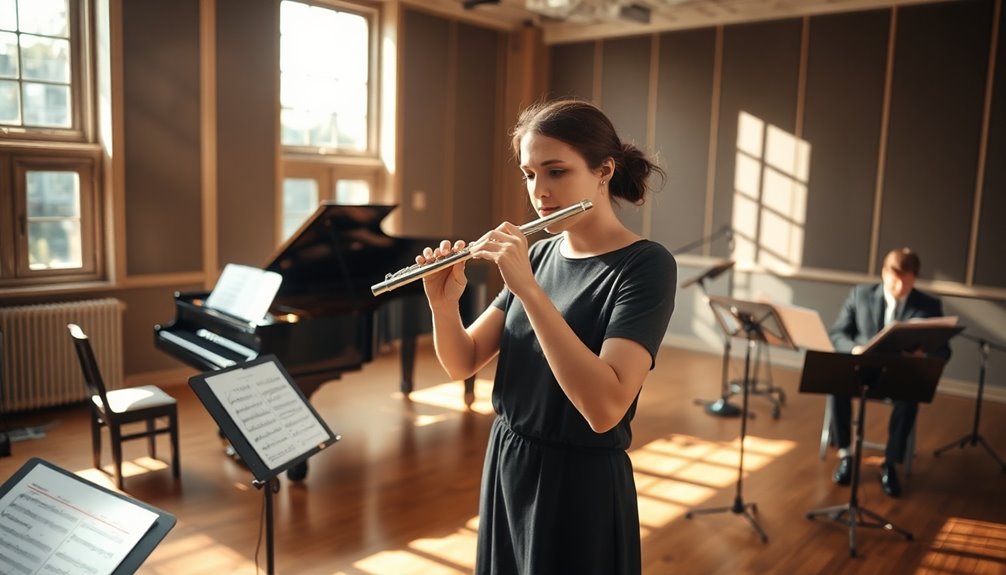
Rehearsals and collaborations form the backbone of a flutist's artistic development, blending individual skills with collective synergy. You'll find that engaging with fellow musicians is where you truly refine your craft. In these sessions, you immerse yourself in ensemble dynamics, learning to listen and respond to the nuances of each player.
As you rehearse, you explore how your sound interacts with others, discovering the delicate balance between asserting your voice and supporting the group. This process ignites a creative synergy that transforms raw notes into a unified musical expression. You notice how a slight adjustment in volume or phrasing can elevate the collective performance, showcasing the importance of communication and empathy within the ensemble.
Each collaboration allows you to embrace different styles and interpretations, fostering growth that individual practice alone can't achieve. You'll come to appreciate the diverse perspectives your colleagues bring, enriching your own understanding of music. Engaging with repertoire such as Fauré's Fantaisie deepens your connection to emotional expression and enhances your collaborative efforts.
In these moments, you create not just sound but a shared experience, a bond that transcends individual talent. Embrace these opportunities, as they're essential in shaping you into a versatile and adaptable musician.
Performance Preparations

Performance preparations often demand meticulous attention to detail, as they set the stage for a successful musical experience. You'll start by confirming your flute is in peak condition, checking pads and springs to avoid any last-minute surprises.
Then, it's time to immerse yourself in your repertoire. You practice not just the notes but also the nuances that breathe life into your performance. Consider your audience engagement; it's essential to connect with listeners, drawing them into the world you create through music.
As you prepare, envision your stage presence. How will you carry yourself? Confidence and poise are important, as they radiate from you, influencing the atmosphere of the performance. Each gesture and expression should resonate with the emotions of the piece, inviting the audience to experience it alongside you.
Visualize the space, the lighting, and even the reactions of your audience, tailoring your performance to evoke the desired response.
Lastly, mental preparation is key. Visualize your success and remind yourself why you're passionate about music. By integrating these elements, you'll guarantee that your performance isn't just a display of technical skill but a shared experience that resonates deeply with everyone present. Additionally, incorporating consistent practice schedules can significantly enhance your performance readiness and confidence.
Balancing Life and Music
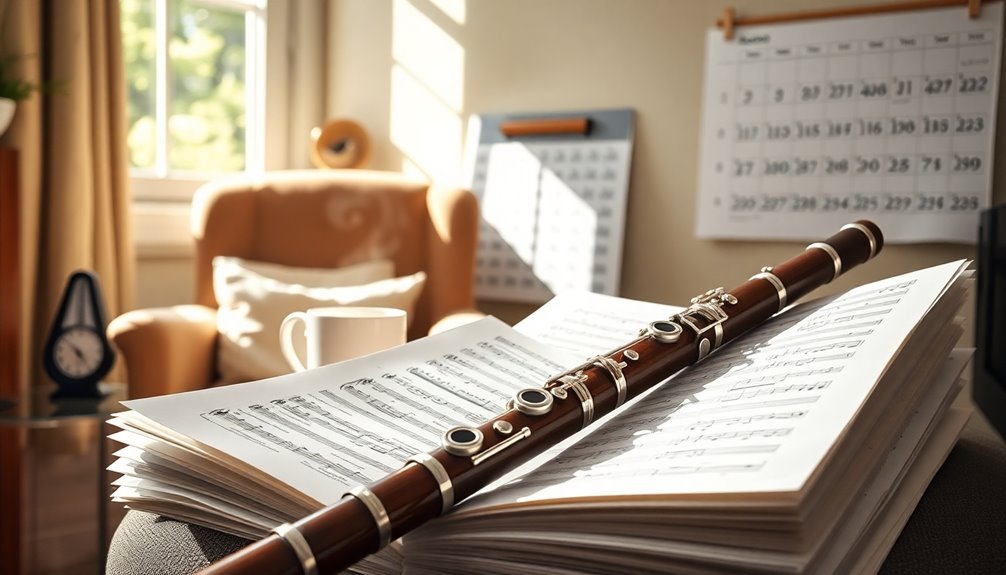
Achieving harmony between your musical aspirations and daily responsibilities is a challenge many flutists face.
You're constantly juggling practice sessions, performances, and the demands of everyday life. Effective time management becomes your ally, allowing you to carve out precious moments for both your art and your personal wellness.
To navigate this delicate balance, consider these strategies:
- Set clear goals for your practice sessions to stay focused and motivated.
- Create a schedule that allocates time for music, work, and self-care.
- Embrace flexibility; sometimes plans change, and that's okay.
- Incorporate breaks to prevent burnout, giving your mind the space to recharge.
- Connect with fellow musicians, fostering a sense of community and shared experiences.
- Prioritize warm-up routines to enhance your breath control and overall performance quality.
Frequently Asked Questions
How Do You Choose Your Flute for Performances?
When you're choosing your flute for performances, it's essential to take into account both flute selection and instrument maintenance.
You should evaluate how the flute feels and responds in various registers. A well-maintained instrument produces a richer tone, enhancing your overall sound.
Always verify the pads are intact and the keys function smoothly. Trust your instincts; the right flute will resonate with you, allowing your artistry to shine and connect with your audience.
What Is the Most Challenging Piece You've Ever Played?
They say, "No pain, no gain," and that rings especially true when you tackle challenging pieces.
The most difficult piece you might encounter often combines intricate technical difficulties with deep emotional connection.
As you navigate the rapid passages and complex rhythms, you'll find yourself pouring your heart into every note.
It's not just about hitting the right sounds; it's about making the audience feel what you feel, creating a bond through your artistry.
How Do You Handle Performance Anxiety?
Handling performance anxiety involves a blend of mindfulness techniques and coping strategies that you can practice.
You might start by focusing on your breath, grounding yourself in the moment. Visualizing success can also help ease your mind.
Engaging in positive self-talk and reminding yourself of your preparation fosters confidence. Embracing the nerves as part of the experience creates a sense of belonging in the performance community, transforming anxiety into an opportunity for growth.
What Are Your Favorite Pieces to Perform?
When you step onto the stage, it's like diving into a vibrant ocean of sound. Your classical favorites, like Mozart's Flute Concerto, resonate with timeless elegance, while contemporary gems, such as Jennifer Higdon's "Rapid Fire," electrify the air with their boldness.
Each note you play weaves a connection, inviting the audience to share in the journey. You find joy in expressing these pieces, as they reflect your passion and artistry, creating a sense of belonging.
Do You Compose Music as Well?
Yes, you do compose music! Your composition process often begins with a spark of musical inspiration, whether it's a melody that pops into your head or an emotion you want to convey.
You explore different harmonies and rhythms, letting your ideas evolve. Each piece reflects your unique voice, allowing you to connect deeply with audiences.
This creative journey not only enhances your artistry but also fosters a sense of belonging within the musical community.
Conclusion
In the symphony of a flutist's life, every note counts, blending passion with precision. As you navigate the intricate dance of practice, rehearsals, and performances, remember that balance is key. Just like a well-tuned flute, your life requires harmony between music and personal commitments. Embrace each moment, for it's in the subtle crescendos and decrescendos that you find your true voice. Keep playing, and let the world be your stage as you breathe life into every melody.

